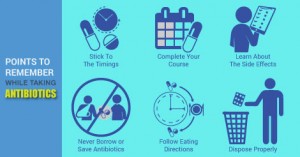POINTS TO REMEMBER WHILE TAKING ANTIBIOTICS
Antibiotics are the drugs your doctor prescribes to treat infections caused by bacteria. Antibiotics are not effective against viruses and therefore should not be used to treat viral infections. Common examples of infections caused by viruses include colds and flu. 
Before the invention of antibiotics, millions of people used to lose their lives during infectious epidemics. While these wonder drugs are now abundantly available we are not using them properly and thus are increasing the incidences of drug resistance, infection recurrence, and side effects. Here are few points to remember while using an antibiotic.
Complete your course: Antibiotic courses may last up to 2 to 5 days or more in some cases. It is very important to complete the course of the drug even if you feel good after one or two doses. Incomplete doses may lead to recurrence of the infection. Also, incomplete doses can make you resistant to the medication and next time it might not help you. 
Stick to the timings: Pop your medication at the fixed time daily for the duration of the drug regime. This is necessary to ensure proper drug concentration in the blood and therefore avoid the development of resistant bacteria.
Make sure to follow doctor’s directions: Some antibiotics must be taken before meals and some after meals. Make sure you follow the doctor’s directions properly; otherwise it can affect the absorption of the drug in the body.
Never borrow or try to cut costs on antibiotics: Antibiotics are prescribed according to the signs and symptoms of an individual patient at a given point of time. Sign and symptoms of different types of infections may be the same sometimes. Therefore, never use leftover antibiotics without consultation with your physician. Never borrow antibiotics from other patients whose symptoms are similar to yours, as they may not have the effect you desire.
Learn about the side effects: Many antibiotics leads to common side effects like nausea, vomiting, diarrhea, blackening of stool, redness in urine, ringing in ears, and so on. Make sure you know about the common side effects of your antibiotics to avoid panic attacks and to also identify any unusual side effect.
Dispose properly: Dispose antibiotics properly to avoid their accidental intake by pets and children.
When an antibiotic is prescribed for you, you should take the following steps:
- Inform your physician of any allergies you have—such as a penicillin allergy—prior to receiving any antibiotics. Women should inform their doctor if they are pregnant. Women also should be aware that some antibiotics could make their birth control pills less effective or make them more susceptible to developing a yeast infection. Your health care provider will discuss recommendations to address these issues.
- Be sure to take the complete amount of antibiotic prescribed according to the physician’s instructions. Failure to comply may result in a re occurrence of the bacterial infection. Know how and when to take your antibiotic.
- Ask your pharmacist about potential side effects, and contact your physician immediately if serious reactions occur.
- If you miss a dose, do not double the next dose. Simply resume with the next scheduled dose as directed.
- Make sure that antibiotics are stored properly. Although most may be stored at room temperature in a dry place, some require refrigeration.

